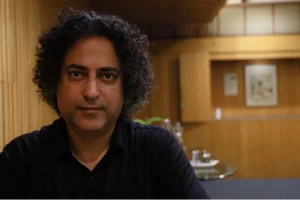Around the year 1998, one of South Kashmir’s most popular militants, Arif Khan of Zangalpora, got killed in an encounter with security forces. Separatist hardliner Syed Ali Shah Geelani, as usual, drove all the way from Srinagar to lead his funeral prayers. Around 40,000 people attended the slain militant’s funeral procession.
Years later, residents of two villages fought over the burial of the Lashkar-e-Tayyiba’s Pakistani chief commander Abu Qasim who was eliminated by the Jammu and Kashmir Police in days of his trapping and killing a prominent counterinsurgent officer, Altaf Dar aka Altaf Laptop. Residents of two villages in the vicinity of Zangalpora laid claim on the mortal remains of Abu Qasim as each wanted his interment in their neighbourhood.
The gun–and its fear or love–loomed large virtually in every mind. Over 20 years later, youngsters of the same village want to excel in education, science and technology. They worship the pen and the laptop. Once a haven of the jihadist insurgency, Kulgam has already produced hundreds of top notch doctors, engineers, academicians and government officers.
Many like cardiologist Dr Feroz Paddar, who owns and operates a hospital in the USA and has raised a major school in Kulgam, have remarkable achievements to their credit. Imtiyaz Ismail Parray, who, unlike others, pursued the Union Public Service’s competitive exams and cracked IPS in 2008, is now a Deputy Inspector General of Police.
Proudly, Muneeb Amin Bhat, aged 21, of Zangalpora has lately etched his name into the annals of the Apple ‘Hall of Fame.’ His achievement lies in the discovery of a vulnerability concealed within Apple’s systems, a flaw with the potential to breach the sanctity of iCloud data.
Apple Inc, a name synonymous with innovation and elegance in the world of technology, has undeniably left an indelible mark on both the global economy and the way we live our lives. Since its inception in 1976, Apple has been a pioneer in shaping the technological landscape. With game-changing products like the Macintosh, iPod, iPhone, iPad, and a host of groundbreaking software and services.
Apple has not only redefined the way we communicate, work, and play but has also played a pivotal role in transforming the world economy.
Bringing Apple to Kashmir scenario may unfold many opportunities as Muneeb, presently pursuing a Bachelor of Computer Applications (BCA) degree through the Indira Gandhi National Open University (IGNOU), embarked upon his journey into the realm of cybersecurity following a pivotal decision to switch from his prior pursuit of a Bachelor of Technology (B.Tech) in Computer Science at SSM, a path he abandoned after a year. This transition was steered by his unwavering ardor for cybersecurity, a passion kindled as far back as 2011-2012, during his fourth-grade years.
“In those early years, the internet’s reach in this region was not as extensive as it is today,” Muneeb recalls. Armed with only a mobile device, he ventured into the limited online resources available to him. “In those days, I was drawn to hacking and using Wi-Fi to gain internet access. Initially, it was a source of amusement, and I remained oblivious to the legal ramifications of such endeavors,” Muneeb told KashmirLife.
With time, Muneeb discovered platforms like YouTube and other websites that disseminated knowledge on ethical hacking – the practice of identifying vulnerabilities in websites and systems and responsibly disclosing them for rewards. “I realized that ethical hacking offered a legitimate avenue to explore my interests and make a positive contribution to the digital world. I undertook the task of mastering the intricacies of ethical hacking, honing my skills over the course of a decade,” reflected Muneeb.
Even with a decade of experience to his credit, Muneeb acknowledges that the ever-evolving technological landscape keeps him perpetually on a learning curve. “The domain of ethical hacking remains in a constant state of expansion, offering an ever-expansive universe of knowledge and opportunities to explore.”
Muneeb presently operates as a freelance ethical hacker, continuously acquiring proficiency in new programming languages and applying them to his work.
Muneeb divulges that eminent tech behemoths like Google, Apple, and Facebook have instituted responsible disclosure programs, extending invitations to knowledgeable individuals to uncover and report flaws or vulnerabilities. These reported issues, when authenticated as bona fide bugs, can yield rewards and the coveted honor of being enshrined in the company’s hall of fame.
Ethical hacking has metamorphosed into an integral component of numerous organizations, including esteemed firms like Tesla, which actively encourages ethical hackers to unearth and responsibly disclose vulnerabilities.
“The rewards for discovering critical vulnerabilities can be substantial, occasionally scaling into the millions, contingent upon the size of the company and the gravity of the vulnerability. There exists virtually no cap on potential earnings, with larger enterprises offering greater remuneration,” he asserted.
In Muneeb’s case, his current endeavour as an ethical hacker translates into a substantial income, with him dedicating 3-4 hours daily to his craft, resulting in monthly earnings that scale into the lakhs. Consistent diligence and dedication in this sphere can pave the way for even loftier financial rewards.
Muneeb’s odyssey stands as a testament to the boundless opportunities and financial prosperity awaiting those who excel in the realms of ethical hacking and cybersecurity, in our contemporary age driven by technology.




















